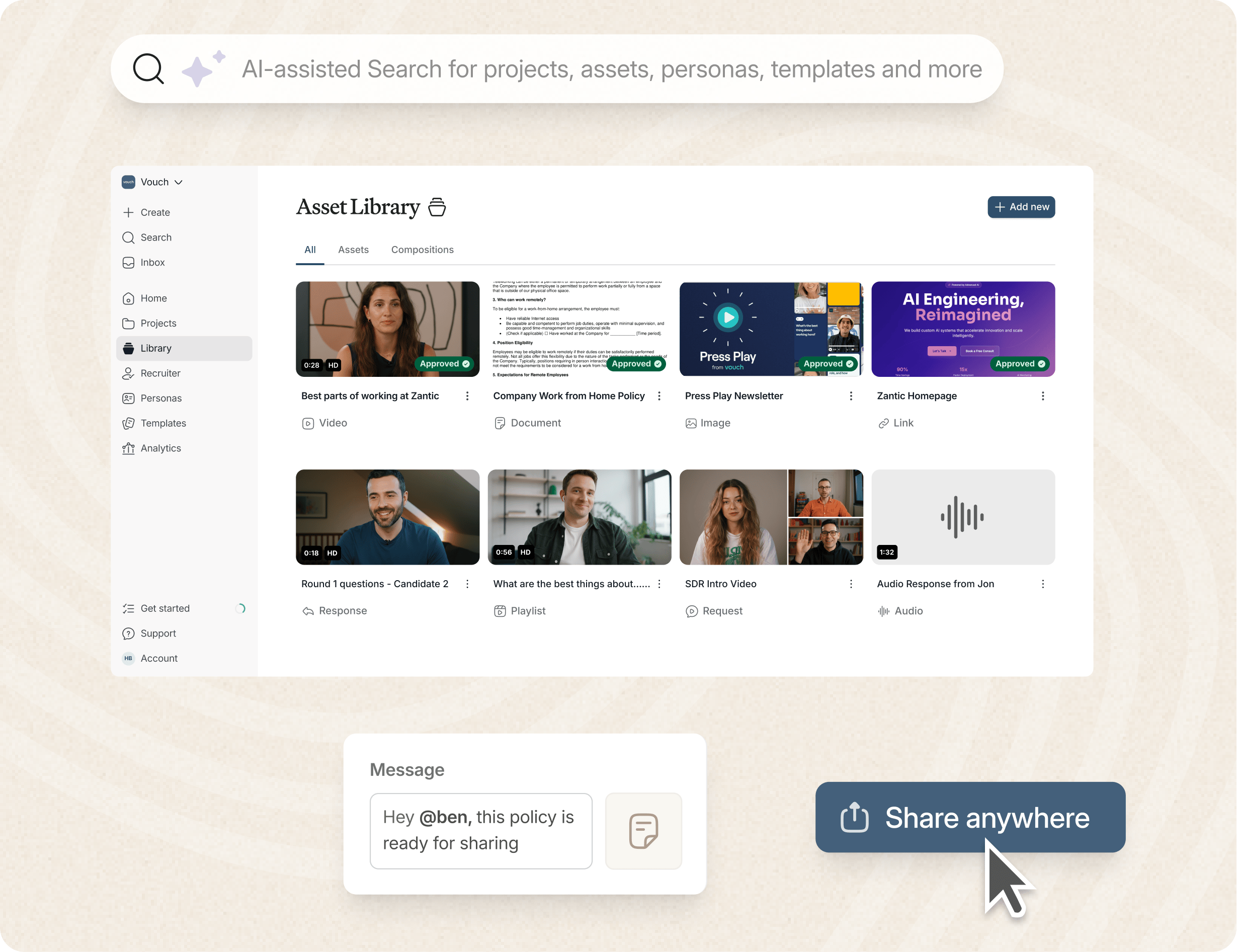Are you looking to hire a new person for a weekend job?
According to the Bureau of Labor Statistics (BLS), about 27.7 million Americans worked part-time jobs in January 2026, which includes weekends-only workers.
Whether you need part-time staff, casual weekend shift positions, or something else, finding suitable candidates can be a challenge, especially reaching and engaging with a Gen Z audience who make up a large portion of weekend employees.
Below are 5 simple strategies for hiring for weekend jobs, from retail positions to hospitality and weekend events.
So let's get started.
Key Takeaways:
- Getting to know the different types of worker agreements in the U.S.
- How to write a job description that attracts the right candidates.
- How to use modern video tools like Vouch to attract and onboard the very best weekend workers.
How Do You Find The Best Weekend Workers?
Before diving into casual vs part-time weekend workers and the US Laws around each, being able to attract the right candidates can often be the most challenging task - so we'll jump into that first.
Here are 5 strategies for attracting the best weekend workers:
1) Showcase your company culture
People shop with their eyes, including for jobs. When it comes to attracting the best weekend workers, we only need to look to giants like McDonalds and Aldi. These companies heavily advertise their workplace and team spirit to attract the best, most dedicated workers.
You can do the same with far less time and costs with modern tools like Vouch, where you get highly effective employee testimonial videos that authentically showcase your company and team, attracting the very best workers.
2) Leverage social media
In January 2026, the United States reached 169 million Instagram users, and many social media platforms are native to Gen Z students and weekend workers.
This is where your employee testimonial videos and recruitment enablement strategies from step one work amazingly well. You can post these on social media with your job description and open up your company to a large pool of weekend workers who might need to be more active on traditional job boards.
3) Streamline your recruitment process
Hiring a weekend or casual worker can often be very different from hiring a full-time worker, as the tasks will often be less detailed and the commitment much lower.
This is also where modern video tools like Vouch are again brilliant, helping you screen more candidates in less time and with lower costs. In fact, giants like Aldi are famous for one-way video interviews, which are a great "first-round" screening tool that helps thousands of H.R. teams around the world—they are also ideal for weekend workers.
The AI-enabled workspace for talent teams.
- Unified workspace for talent teams
- Accelerate hiring with AI tools
- Auto-generate polished hiring and employer brand content
- Easily repurpose assets across all channel

What Type Of Employment Setup Is Best For Your Company?
In the United States, there are several types of weekend worker contracts that employers may use to schedule employees to work on weekends.
Below is only a guide, and if you are looking for the laws or are unsure and are in the U.S., please contact the Department of Labor (DOL). The U.S. Department of Labor is responsible for enforcing federal labor laws, including those related to minimum wage, overtime pay, workplace safety, and family and medical leave.
Knowing that, here are the most popular types of weekend worker arrangements:
1. Regular Part-Time Employees
work a set number of hours each weekend as part of their regular schedule. Depending on their employer's policies, they are typically entitled to benefits such as paid time off and healthcare.
2. Temporary or Seasonal Workers
Workers hired for a specific period, such as during busy seasons or for special events that occur on weekends. They may be full-time or part-time and may or may not be eligible for benefits.
3. Shift Workers
Employees who work on a rotating schedule that includes weekends, often in industries that require continuous operations, such as healthcare, hospitality, and manufacturing.
4. On-Call Workers
Workers who are not scheduled to work but are available to work if needed. They may receive additional pay for being on-call, even if they are not ultimately called in to work.
5. Contract or Freelance Workers
Workers who are hired on a contract basis to perform specific tasks or projects on weekends. They are not considered employees and are not entitled to benefits.
6. Seasonal or Gig Workers
Individuals who work on weekends for short-term or temporary positions, often through platforms or apps that connect them with jobs, such as driving for ride-sharing services or delivering food.
It's important for both employers and employees to understand the terms of the weekend worker contract, including pay rates, benefits, and scheduling requirements.
Now, let's dive into the contractual differences.
What Are The Different Types of Casual Worker Agreements?
When hiring for weekend jobs, it is crucial to understand the different types of casual worker agreements.
The below is just a guide; please contact the U.S. Department of Labor if you are unsure of which arrangement best suits your needs or legal requirements.
1. Single Assignment Agreement
A single assignment agreement is suitable when hiring casual workers on a one-off basis or for specific tasks. This agreement outlines the details of the assignment, such as employment duration, scope of work, and payment. This type of agreement is ideal for short-term projects or occasional work.
2. Zero Hour Contract
A zero-hour contract is a flexible arrangement where the employer does not guarantee a regular number of hours to the worker. The worker is engaged on an as-needed basis and has no obligation to accept the offered hours. This type of agreement is suitable for businesses with fluctuating demand or variable workloads.
3. Casual Worker Agreement
A casual worker agreement is designed to engage workers on a regular basis but without providing them with fixed hours each week. Please note that if you require fixed hours, you will need to comply with part-time labor laws.
A casual worker agreement outlines the terms of employment, including the availability and scheduling arrangements. This type of agreement is suitable when you require flexibility in the number of hours worked and also need regular availability from a casual worker.
Each agreement has its distinct contractual terms and laws, so you need to ensure you carefully consider the nature of the job and the frequency of work required to establish clear expectations and avoid any potential misunderstandings.
How Do You Create a Casual Worker Agreement?
Once you have found the right candidate for your weekend job, you can offer them work on a casual basis using a casual worker agreement. These agreements need to:
- Include provisions for minimum notice periods to ensure both parties have sufficient time for planning and adjustment.
- Specify the wages and payment terms, ensuring clarity and fairness for the casual worker.
- Address employment rights to protect the interests of both parties, including factors such as work hours and conditions.
This tailored agreement is a valuable tool that helps both the employer and the casual worker understand their rights and responsibilities. By establishing clear expectations and terms, you can foster a professional and mutually beneficial working relationship.
What Rights Do Casual Workers Have?
In the United States, the rights of casual workers are governed by several government bodies at the federal and state levels. Here are some key agencies and laws that oversee the rights of casual workers:
1. Department of Labor (DOL)
The U.S. Department of Labor is responsible for enforcing federal labor laws, including those related to minimum wage, overtime pay, workplace safety, and family and medical leave. The DOL's Wage and Hour Division is particularly relevant for issues affecting casual workers.
2. Equal Employment Opportunity Commission (EEOC)
The EEOC enforces federal laws that prohibit employment discrimination based on race, color, religion, sex, national origin, age, disability, or genetic information. Casual workers are protected from discrimination under these laws.
3. Occupational Safety and Health Administration (OSHA)
OSHA is responsible for ensuring safe and healthy working conditions for all workers, including casual workers. OSHA sets and enforces standards and provides training, outreach, education, and assistance.
4. State Labor Departments
Each state has its own labor department or agency that enforces state labor laws, which may include minimum wage, overtime pay, workers' compensation, and other protections for casual workers. State laws can vary, so it's important for casual workers to be aware of the laws in their state.
5. National Labor Relations Board (NLRB)
The NLRB enforces the National Labor Relations Act, which protects the rights of employees to engage in collective bargaining and other concerted activities for mutual aid and protection. Casual workers who are part of a union have rights under this law.
What About Hiring A Part-Time Weekend Employee?
In the United States, part-time employees are generally covered by the same labor laws as full-time employees. Still, there are some differences in how certain benefits and protections are applied. Here are some key rules for part-time employees in America:
1. Minimum Wage
Part-time employees are entitled to the federal minimum wage, which is $7.25 per hour as of 2026. Some states and cities have higher minimum wage rates.
2. Overtime Pay
Part-time employees are entitled to overtime pay at a rate of 1.5 times their regular rate of pay for hours worked over 40 in a workweek unless exempted by law.
3. Health Insurance
Under the Affordable Care Act (ACA), large employers (typically those with 50 or more full-time equivalent employees) must offer health insurance to eligible employees, including part-time employees who work an average of at least 30 hours per week.
4. Family and Medical Leave
Part-time employees may be eligible for unpaid leave under the Family and Medical Leave Act (FMLA) if they have worked for a covered employer for at least 12 months, have worked at least 1,250 hours during the previous 12 months, and work at a location where the employer has at least 50 employees within 75 miles.
5. Workers' Compensation
Part-time employees are generally covered by workers' compensation laws if they are injured on the job, regardless of their part-time status.
6. Discrimination and Harassment
Part-time employees are protected from discrimination and harassment based on protected characteristics such as race, gender, age, disability, and religion under federal and state laws.
7. Unemployment Benefits
Part-time employees may be eligible for unemployment benefits if they lose their job through no fault of their own and meet the state's eligibility requirements, which may include having earned a certain amount of wages during a base period.
It's important to note that some rules and benefits may vary depending on the state and the employer's policies.
FAQs
What is a casual worker?
A casual worker is a person who does not have a fixed number of hours each week and is not guaranteed any future shifts or work. They are typically offered casual work and often on short notice. If their work is on regular weekends, you may need part-time employment.
How can I find suitable candidates for weekend jobs?
In addition to traditional job boards, you can leverage modern tools like Vouch to create employee testimonials that you can share on social media to reach a much wider weekend worker audience. Vouch can also help streamline your recruitment.
What are the different types of agreements for engaging casual workers?
The three common types of agreements are single assignment agreements, zero-hour contracts, and casual worker agreements. Additionally, if you need regular weekend workers, you may also need to consider the part-time agreement. a Each agreement has its own provisions regarding the nature and frequency of work, as well as the obligations of both the employer and the worker.
Conclusion
When it comes to hiring for weekend jobs, following the latest strategies to reach a wider talent pool can make all the difference. This is why social media can be so powerful, as it lets you reach a wide talent pool.
By understanding the nature of casual workers and their jobs, you can identify the types of positions that need to be filled.
Incorporating video content into your hiring process for all kinds of workers can also make a huge difference and help to reduce costs. Tools like Vouch make building your employer brand and showcasing your company culture remarkably easy, helping you create video content that captures authentic employee experiences.
Vouch Make Recruitment Simple!
Loved by companies like Canva, Nike, Cisco, HubSpot, Amazon, and more, tools like Vouch make leveraging video in your business remarkably easy.
Be sure to book a Vouch demo today and chat with a video content expert today.
You might also like

Elevate Your Brand Today With Vouch
Discover how Vouch can accelerate talent acquisition while helping you stay on-brand.






